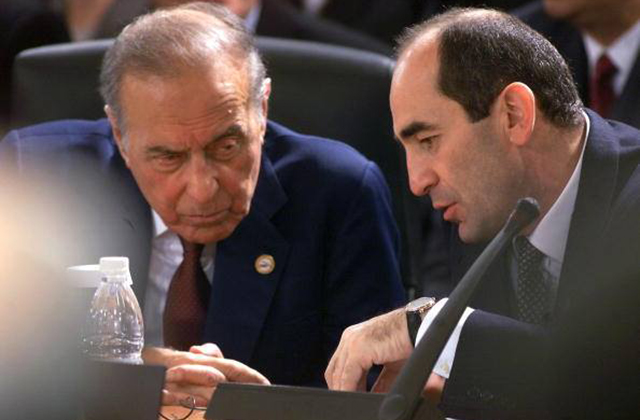To Ideologists of ‘Triumphant’ Settlement

Since the ceasefire agreement reached in May 1994 on Nagorno-Karabakh conflict zone, the issue has had considerable impact on Armenia’s internal political struggle, and sometimes also passed certain signals to domestic policy agenda. Perhaps any other approach for near future may be excluded for the simple reason that besides being one of crucial directions of Armenia’s foreign policy, the NK issue is of vital importance for all Armenians, including Armenia’s society.
From this perspective it was beyond suspicion that as a result of Azerbaijan’s aggression in April, then sharp activation of mediation efforts, meetings of Armenian and Azerbaijani presidents in Vienna, then in St. Petersburg, should have attached attention of political and expert circles, as well as of the society. It was also clear that after the meetings there wouldn’t be lack of miscellaneous assessments, judgments and anticipations, there would be not only unbiased assessments, but also allegations far from the reality, that Armenia promised to concede territories for some suspicious peace. And even those allegations could be explained by the rules of the genre, if not recent developments targeted at inflaming internal atmosphere, which, seemingly, are also conditioned by NK issue.
It should be noted, that in his call on attack at the police station by “Sasna Tsrer” group, Varuzhan Avetisyan, more exactly, the Founding Parliament stated,
“We apply to the authorities of Artsakh:
Main instigation for the rebellion is the aspiration to guarantee the security of Artsakhi people and Artsakh’s territorial integrity. Stay on your positions and unite people of Artsakh. In a few days you’ll be convinced how Armenia’s truly national Government mobilizes all Armenians to provide Artsakh’s security.”
In Yerevan’s heated atmosphere the statement by Varuzhan Avetisyan didn’t gain proper attention. Thus, after the armed group surrendered, president of Founding Parliament Garegin Chugaszyan concretized on August 8, “Forthcoming external political pressures linked to Artsakhi issue will directly blast current regime from inside…” Thus, the hypothesis that both the Founding Parliament and a range of political and social figures close to them, to the issue of vital importance for Armenians, looking from narrow personal perspective, again attempted to implement regime change with the pretense of NK issue.
We consider, that also not accidentally, reflecting to the recent interview of NKR president Bako Sahakyan on August 25 to Voice of America, already Vartan Oskanian, former MP and head of newly established Unity party, accused the authorities of defeatism,
“This interview was really a defeatist one, completely wrong signals are being sent both to the mediators and the adversary. I don’t know, I have an impression after this interview, that we should return territories only for some autonomous status within Azerbaijan, i.e. for not so high autonomy, where rights of the people of Nagorno Karabakh will be recognized, respected, where people may leave on that territory peacefully. I repeat once again, this has been unprecedented throughout the last 25 years and is absolutely unacceptable. If there are people, who got along with that idea, appear from defeatist positions, I ask them to withdraw: there are more capable people, who are able to change the situation, put forward the issue more clearly, appear from principal positions and sharply change the situation. I simply see that possibility.”
However, here we have to record that Vartan Oskanian’s presence, as appearance from principal positions, depreciates the idea of ‘triumphant’ settlement itself. The point is, following a short period of regime change with NK pretense, Oskanian himself has repeatedly refused the ‘triumphant’ variant of NK conflict settlement, as if for the sake of peaceful settlement principle, stating, “At this stage the Armenian side doesn’t insist on NKR independence or uniting it to Armenia, as it considers peaceful settlement of the conflict important” (“Azg” daily, 22 May 1998). And a few months later the main ideologist of ‘triumphant’ settlement of those days had already been capitulated before OSCE, “Let me not clearly express readiness of my Government not to set forward any claim for independence or unity with Armenia..” (“Azg” daily, 1 October 1998).
Obedience of NK authorities has been guaranteed yet at the preparation stage of regime change, when attempting to oppose what was said at the press conference of Levon Ter-Petrosyan, NKR president Arkadi Ghukasyan insisted 7 October 1997, that NK supports package settlement, then added—for the sake of regime change in Armenia, he withdrew from the idea of independence, “When throughout the whole period of negotiations NKR authorities didn’t claim to discuss NK independence from mediators, Azerbaijan and even Armenia’s representatives,” Arkadi Ghukasyan said, openly promising to concede the territories without preconditions, except Lachin (“Hayastani Hanrapetutyun” daily, 8 October 1997).
As a result, in November 1998 OSCE MG Co-Chairs introduced new proposals of the settlement to the sides, which are known in the settlement history as “Common state.” In “Concord on Nagorno Karabakh’s status” section it was planned: “Karabakh formulates a “Common state” together with Azerbaijan within its internationally recognized borders,” “NK citizens will have Azerbaijani passports, as a document of identity confirmation, with the note “Nagorno Karabakh.” Fortunately, Azerbaijan refused those settlement proposals, and Armenia and Nagorno Karabakh at least publicly accepted them.
Besides, there is much evidence, that in April 1999 in Washington at celebration devoted to NATO’s anniversary, during Aliyev-Kocharyan meeting Kocharyan and Oskanian bargained Armenia’s territorial integrity and sovereignty. It’s enough to state, that already after the forth meeting of this stage, which took place in Warsaw, Kocharyan stated, “Armenia’s current authorities consider, that for the sake of integration a part of independence should be conceded” (“Azg” daily, 17 August 1999).
Obviously, Meghri would simply counterbalance Lachin, and NKR status would be solved with maintenance of Azerbaijan’s territorial integrity. Evidence to that were incoherent ideas expressed by Vartan Oskanian at NK NA on August 17, “Settlement of the issue supposes one solution to the Armenian side, when Artsakh de facto can be independent, and de jure not within Azerbaijan. This is what is diplomatically observed as a status higher than autonomy, lower than independence” (“Hayastani Hanrapetutyun” daily, 8 August 1999). What is ridiculous, this Oskanian-like confusion enjoyed indifference not only of Karabakh’s Parliament, but also of NKR army the then commander Samvel Babayan.
Negotiations on exchange of territories reached their culmination in spring of 2001. In the period of April 3-7 under the patronage of C.Powell, U.S. Secretary of State, and with the participation of OSCE MG Co-Chairs after another meeting in Key West, the sides recorded big progress in conflict settlement process. What is noteworthy, the progress was symbolized by photos of Kocharyan and Cavano, working on the map.
Later on it would turn out that the Key West plan was including not only channels through Meghri, but through the territory of Armenia as well, on which international control would be provided, which, basically, was restriction of Armenia’s sovereignty. Fortunately, this stage of the settlement was stopped due to health problems of Heydar Aliyev, and after his death Ilham Aliyev claimed to start the negotiations anew.
Until now there is no need touching upon “Prage process” and Madrid Principles developed as a result. Firstly, as in that period the sides were already guided by the strategy of postponing the settlement. Secondly, as the processes of the three years, following the regime change, are completely enough to show, that those speculating Karabakh issue no matter what a ‘triumphant’ program it may be, even after coming to power, they continue refer to NK issue from personal perspective, or they give certain promises to the international community prior to coming to power, which they are obliged to implement then.
A logical question arises: are the variants spread on Serzh Sargsyan as well, on account of the fact, that he was in the camp of the 1998 ‘triumphant’ position? Probably—no. However, those days Sargsyan was completely demarcated from the course of foreign policy, thus, it’s less probable, that mediators attempted to have some promises from him. And, besides that, he assumed the position of the president after elections and not as a result of extraordinary processes, which gives hope, that he might prefer NK interest from his personal.
At the same time, however, recent developments showed that Serzh Sargsyan has more obligations before NK, than protection of interests of those countries in negotiations. In particular, at the moment he’ll lay down the power, authorities and opposition should have been developed in the country, which will consider speculation of NK issues improper. Otherwise, the “We don’t have a country to turn into a circus” allegation will be equal to nothing.
By Marine Karapetyan

























